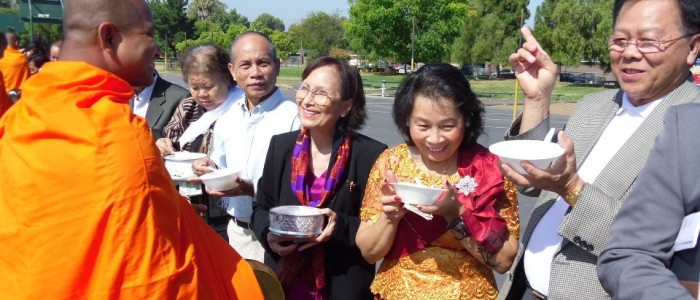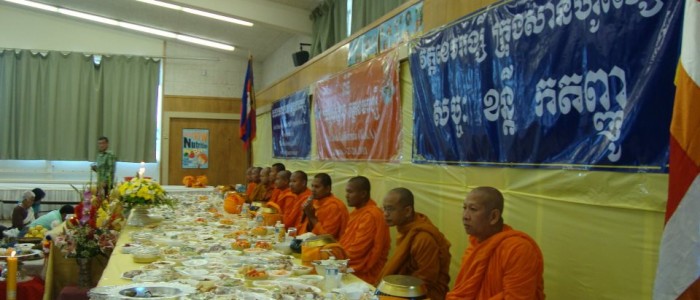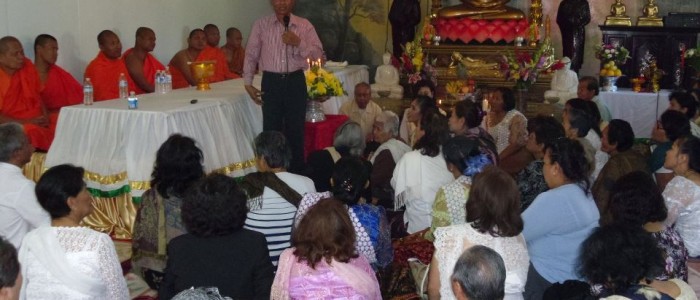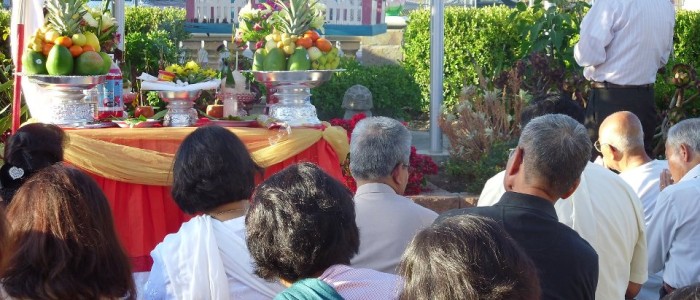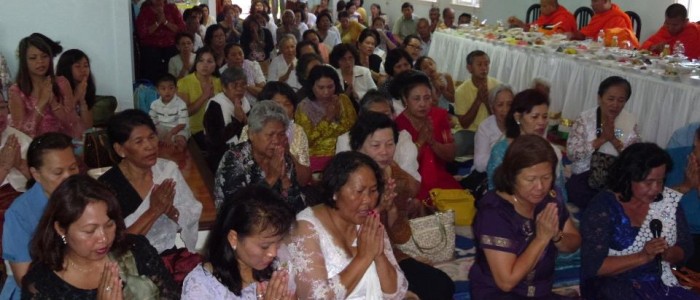The Cambodian members of UKKNOI practice Theravada Buddhism. This page will help readers to understand what the Theravada Buddhism is.
General Knowledge about Theravada Buddhism
“Theravada (Pāli: थेरवाद theravāda (cf Sanskrit: स्थविरवाद sthaviravāda); literally, “the Teaching of cialis coupon the Elders”, or “the Ancient Teaching”) is the oldest surviving Buddhist school. It is relatively conservative, and generally closest to early Buddhism, and for many centuries has been the predominant religion of Sri Lanka (about 70% of the population) and most of continental Southeast Asia (Cambodia, Laos, Burma, Thailand). It is also practised by minorities in parts of southwest China (by the Shan and Tai ethnic groups), Vietnam (by the Khmer Krom), Bangladesh (by the ethnic groups of Baruas, Chakma, and Magh), Malaysia, Philippines and Indonesia, whilst recently gaining popularity in Singapore and Australia. Today Theravada Buddhists number about 200 million worldwide, and in recent decades Theravada has begun to take root in the West and in the Buddhist revival in India.” (http://www.theravadabuddhism.org/)
Dr.David N. Snyder wrote an excellent book about Theravada Buddhism that can be read at: The Complete Book of Buddha’s Lists
The Needed of the Theravada Buddhism for Cambodian Abroad
Buddhism is not just purely a religion for Cambodian, but it is also part of the culture of Cambodian. In most of ceremonies, the Cambodian always invite Buddhist monks to conduct religious services, such as: New Year Celebration, Weddings, Funerals, Open Houses, Blessings, etc. Therefore, wherever there is a Cambodian community, there is a Cambodian temple.
When the Khmer (from Cambodia) and Khmer-Krom (from Kampuchea-Krom which is currently known as Mekong Delta in South Vietnam) left their country after the war to settle abroad, they started forming their Cambodian community along with their Buddhist temple. Some places, there are many Cambodian, so they can afford to build a temple like in Cambodia or in Kampuchea-Krom. In some places, there are few Cambodian but they still try to form a community having a place for Buddhist monks to stay, a worship place that has Buddha statue, and provide religious services to the members. The Cambodian still call those monk residents as temples to respect to the place that has Buddha statue and Buddhist monks.
The Cambodian abroad is facing seriously about not having enough Buddhist monks to conduct religious services. In some important events, such as: Kathina, it requires at least 4 Buddhist monks to conduct the service. In Some communities, the Cambodian have to invite the Buddhist monks from Laotian, Sri Lanka, and Thai temple to have enough Buddhist monks to conduct the services. Sometime, there are not enough Buddhist monks to conduct the services for members if the members organize the events at the same time.
Besides providing religious services to the community members, in some places, the Buddhist monks also carry on an important role as teacher to teach Cambodian language for the Cambodian youths to keep their language alive.
Basic Important Information about Cambodian practicing Theravada Buddhism
Most of the Cambodian Buddhist monks are ordained when they were teenager. Traditionally and culturally, the Cambodian boys must ordain to be Buddhist monks to learn about Theravada Buddhism, the Discipline and Morality, before they get married. Becoming a Buddhist monk is an honor for a Cambodian boy and also to pay respect to their parents and make their parents proud.
The Cambodian Buddhist monks practice Theravada Buddhism. Thus, they are allowed to eat meat and only allowed to eat from the morning (when the sun rises) until Noon. They are not allowed to eat anything after lunch, but water or soft drink.
In Cambodia or Kampuchea-Krom, the Buddhist monks go for almsing to receive foods donated by the Buddhist followers. Most of the temple abroad, the Cambodian people bring foods to the temple to serve the Buddhist monks every day. The Cambodian people believe that when they serve foods for the Buddhist monks, those foods would be conveyed to their passed-away family members.
The woman is not allowed to touch the Buddhist monks. Some of the women westerners wonder why the Cambodian Buddhist monks don’t shake-hand with them.
The Buddhist monks strictly follow the Theravada Buddhism’s principles. They are not allowed to work for salary or having affair with the woman during their monkshood. The Cambodian Buddhist monks are allowed to leave their monkshood if they want to continue to live the rest of their lives as a normal person.


